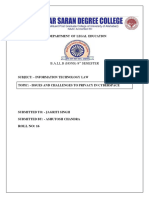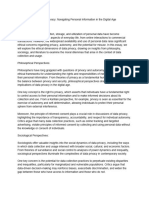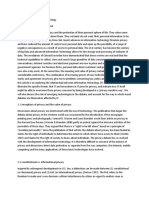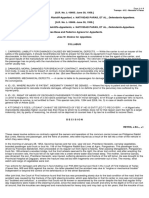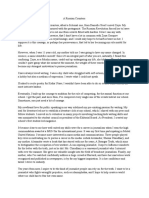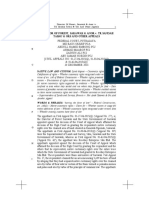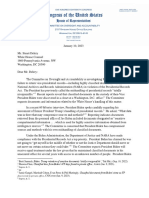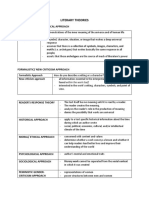The Ethics and Challenges of Digital Privacy
In the 21st century, digital privacy has become one of the most pressing issues at the
intersection of technology, law, and ethics. As society continues to depend on the
internet, smartphones, and digital services for everyday life, questions about how
personal data is collected, stored, and used have become increasingly urgent. Digital
privacy concerns touch nearly every aspect of modern existence, from online
shopping to political campaigns, from social networking to health care. The erosion of
privacy in the digital world raises ethical debates about autonomy, consent,
surveillance, and power.
One of the central ethical challenges of digital privacy stems from the fact that data
has become the new currency of the digital economy. Companies like Google,
Facebook, and Amazon rely heavily on collecting and analyzing user data to drive
targeted advertising and optimize services. While users may benefit from
convenience, efficiency, and personalization, they often do not fully understand the
extent to which their personal information is being harvested. This imbalance creates
an ethical dilemma: individuals have limited control over their own data, while
corporations and governments gain unprecedented power to monitor and influence
behavior.
Governments, too, are deeply entangled in the digital privacy debate. National
security agencies justify mass data collection as a necessary tool in combating
terrorism and maintaining public safety. However, large-scale surveillance raises
significant concerns about civil liberties. The revelations by Edward Snowden in 2013
exposed the scale of the U.S. National Security Agency’s global surveillance
operations, sparking worldwide debate about whether security justifies such
intrusions. Democracies face the difficult task of balancing citizens’ rights to privacy
with their collective need for protection.
Ethically, digital privacy is tied to the concept of informed consent. Users should, in
theory, be able to decide what information they share and with whom. Yet, in practice,
consent is often buried in lengthy terms of service agreements filled with legal jargon
that few people actually read. As a result, many individuals are unaware of what they
are agreeing to. This lack of transparency undermines the ethical principle of
autonomy, where individuals are supposed to maintain control over their own personal
choices and information.
Another dimension of digital privacy involves the risks of data breaches and
cyberattacks. When corporations store massive amounts of personal data, they also
�become targets for hackers. Breaches at companies like Equifax, Target, and Marriott
have exposed millions of users to identity theft and financial fraud. Such incidents
highlight the ethical responsibility of corporations to protect the data entrusted to
them. Weak cybersecurity measures or careless handling of data are not just
technical failures; they are violations of the trust between organizations and the public.
The question of digital privacy also intersects with broader social justice concerns. In
many cases, vulnerable populations—such as marginalized communities, refugees, or
political dissidents—face disproportionate risks from surveillance and data misuse.
Authoritarian governments often use digital monitoring to suppress dissent and control
their citizens. Facial recognition technology, for example, has been used in some
countries to track protesters and limit freedoms of assembly and expression. Such
practices highlight how the erosion of digital privacy can directly threaten human
rights.
On the flip side, there are arguments that some degree of data collection can serve
the public good. For example, aggregated health data can be used to track disease
outbreaks or improve medical research. Location data can help improve traffic
management and city planning. The ethical debate, then, centers not on whether data
should ever be collected, but on how it should be collected, used, and safeguarded.
The challenge lies in creating systems that ensure transparency, accountability, and
fairness while respecting individual rights.
In response to these challenges, policymakers have begun to implement regulations
designed to protect digital privacy. The European Union’s General Data Protection
Regulation (GDPR), enacted in 2018, is one of the most comprehensive legal
frameworks to date. It gives individuals greater control over their personal data,
requiring companies to obtain clear consent and allowing users to request data
deletion. In the United States, privacy laws remain fragmented, but states like
California have passed their own legislation, such as the California Consumer Privacy
Act (CCPA). These measures reflect a growing recognition that ethical norms must be
reinforced with legal protections.
Looking forward, the ethics of digital privacy will only grow more complex as
technology evolves. Emerging fields such as artificial intelligence, biometrics, and the
Internet of Things (IoT) raise new questions about how much data can be collected
and how it will be used. For example, smart home devices that listen to conversations
or wearable devices that track heart rates generate intimate data that could be
misused if not properly protected. Ethical frameworks must continue to adapt to
ensure that technological innovation does not come at the expense of fundamental
�human rights.
In conclusion, digital privacy represents one of the most critical ethical issues of our
time. It requires careful consideration of how data is collected, who has access to it,
and how it is safeguarded. At its core, the debate is about more than just technology;
it is about power, trust, and human dignity. By developing stronger legal protections,
promoting transparency, and holding corporations and governments accountable,
societies can work toward solutions that balance innovation with respect for individual
rights. The future of digital privacy depends not only on technological safeguards but
also on ethical commitments to fairness, autonomy, and justice.
Works Cited
“General Data Protection Regulation (GDPR).” European Union, 2018.
https://gdpr-info.eu.
Greenleaf, Graham. “Global Data Privacy Laws 2021: Despite COVID Delays, 145
Laws Show GDPR Dominance.” Privacy Laws & Business International Report, no.
169, 2021, pp. 10–13.
Solove, Daniel J. “A Taxonomy of Privacy.” University of Pennsylvania Law Review,
vol. 154, no. 3, 2006, pp. 477–560.
Zuboff, Shoshana. The Age of Surveillance Capitalism. PublicAffairs, 2019.























